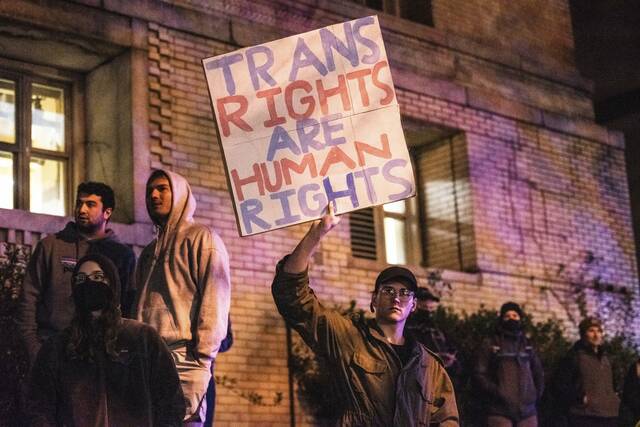Macaiah Thaxton, a senior at the University of Pittsburgh, supports rights for transgender people but also understands why Pitt did not stop conservative guest speaker Michael Knowles from debating about the topic during a protest-provoking event on campus.
“Do I think that Michael Knowles is someone who I would like to have a platform on this campus? No,” said Thaxton, 20, of Oakland, while sitting outside of the William Pitt Student Union on Wednesday.
“I don’t think trans rights are up for debate. I don’t believe anyone’s right to exist should be debated,” Thaxton said. “I understand how hurtful it can be when an institution we’re all part of doesn’t outright disagree with or denounce this type of hate speech.
“But (Pitt) is a public institution trying to maintain neutrality.”
Several students and First Amendment experts Wednesday backed Pitt’s decision not to cancel the controversial Tuesday night event.
They noted the university was improving in how it notified students when protesters set off an “incendiary device,” which turned out to be a smoke bomb and fireworks. A body dummy with a photo of Knowles’ face was also set on fire in the street.
The Intercollegiate Studies Institute (ISI), which sponsored the event, “Should transgenderism be regulated by law?,” said Wednesday it was trying to organize “a civil debate on the important topic of transgenderism and law.”
Pitt College Republicans, the group that hosted the event, did not return a request for comment.
“Radical activists threw smoke bombs at students making their way into the event venue,” said John A. Burtka IV, ISI’s president and CEO. “Security for the event, both for Pitt police and private security, cost over $20,000, and the protection provided was inadequate to ensure a peaceful environment for the exercise of free speech.”
Burtka also criticized the Pitt staff.
“Now that Pitt has abandoned its historic commitment to the pursuit of truth and virtue, as their motto states, and kowtowed to rioting anarchists,” he said, “why would any reasonable parent consider spending $24,962 to send their child into harm’s way, all while being indoctrinated in the most radical views about what it means to be human and an American?”
Pitt did not see it that way.
“As a public institution, the University of Pittsburgh upholds the principles of protected speech, even when that speech marginalizes some members of our community,” said university spokesperson Jared Stonesifer. “At the same time, the university is also deeply invested in cultivating an environment that fosters mutual respect, concern for others, diversity and inclusion.”
The protest
“Hey, hey! Ho, ho! Transphobia has got to go!” more than 200 protesters chanted Tuesday night, many waving trans rights flags or holding signs with slogans such as “No hate in Appalachia” and “Trans rights are human rights.”
Police — dozens of officers from the University of Pittsburgh, the City of Pittsburgh, and Carnegie Mellon University — stood patiently shoulder-to-shoulder and often stone-faced behind barricades as the protest unfolded.
The protest ran for more than six hours before police ordered them to go home. Knowles, who poked fun at the protests during the event, departed around 9 p.m.
No injuries were reported and there was no damage to Pitt buildings, some of which went into lockdown during the protest.
Pitt and City of Pittsburgh police “worked to ensure the safety of both attendees and demonstrators,” Stonesifer said.
“Three officers were evaluated by medics but were not transported (to a hospital),” he said. “Officers temporarily detained a number of individuals as part of their investigation into the incendiary device used this evening.”
No arrests were made in connection with the protest, according to University of Pittsburgh police and Pittsburgh police. Both declined further comment.
The law
Pitt could not cancel the event because it is a public, state-related university — and the First Amendment applies to government agencies, according to Jon Pushinsky, an adjunct law professor at Pitt and practicing attorney.
“There are some students that will always push the limits, which doesn’t make it impermissible,” Pushinsky said.
Three types of speech — libel, obscenity, and “fighting words” — are not protected by the Bill of Rights, Pushinsky said. “Fighting words,” something that invokes a violent response, have not received much attention in courts in recent decades.
“The speech has to advocate imminent, lawless action and is likely to achieve that result” in order to not be protected under the First Amendment, he added. “I consider it repugnant speech, whether it’s against trans people, Jewish people, people of color — but that doesn’t mean it’s not protected … The First Amendment is designed to protect the speech we don’t like.”
Others lamented that the protesters were trying to squelch free speech.
“It is appalling to me that rabid members of the trans movement are attempting to prevent free speech and opposing opinions at my beloved alma mater,” said Phyllis Kanarkowski, who graduated from Pitt in 1970 and lives in New Jersey. “A university — of all places — should be the arena for various opinions, perspectives and spirited (not violent) debate and expression.”
“During the Vietnam War and the civil rights movements, folks on campus expressed their stands one way or the other,” she added. “We tolerated and were respectful of someone who had a different side to support.”
Emergency notifications improving
The university’s emergency notification system worked effectively Tuesday night, university officials said a day later.
“Those operating it acted quickly and capably and achieved the primary goal of keeping our campus community safe, while also keeping people informed in a timely and accurate manner,” said Ted Fritz, vice chancellor for public safety and emergency management.
“We heard clearly that our community wants faster, more frequent information, even if we don’t have a complete picture to share,” Fritz said. “Last night, we were able to alert the community to a situation while we were still assessing it, and then provide ongoing details, action items and updates on emergency.pitt.edu and social media. We saw traffic on these sites in the tens and hundreds of thousands, which is great.”
Some Pitt students speaking to the Tribune-Review on Wednesday also said Pitt was much better at sending emergency notifications during the protests than it was during an April 10 active shooter hoax at Hillman Library — to a fault.
“By the time the notification was sent out (about the shooter hoax) it was after I went running with the crowd, hiding in the Litchfield Towers and frantically calling everyone to make sure they were safe,” said Elizabeth Conroy, 19, of Oakland, a Pitt sophomore.
On Tuesday, “every five seconds, they were updating. If the response to (the shooter hoax) was more adequate, I would understand,” Conroy added. “It was kind of a lousy attempt to overcompensate.”
Fritz defended the system, and said officials learned a lot from Tuesday’s protest.
“We will conduct an after-action review to identify areas for future improvement,” Fritz told the Tribune-Review. “We will continue to look for ways to improve how we communicate during rapidly evolving situations, both in the near and long term, to ensure the safety of our university community.”











